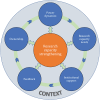Embedding research capacity strengthening in multi-country studies in low-and middle-income countries: learnings from sexual and reproductive health research
- PMID: 38607331
- PMCID: PMC11018088
- DOI: 10.1080/16549716.2024.2338634
Embedding research capacity strengthening in multi-country studies in low-and middle-income countries: learnings from sexual and reproductive health research
Abstract
Research capacity strengthening (RCS) can empower individuals, institutions, networks, or countries to define and prioritize problems systematically; develop and scientifically evaluate appropriate solutions; and reinforce or improve capacities to translate knowledge into policy and practice. However, how to embed RCS into multi-country studies focusing on sexual and reproductive health and rights (SRHR) is largely undocumented. We used findings from a qualitative study, from a review of the literature, and from a validation exercise from a panel of experts from research institutions that work on SRHR RCS. We provide a framework for embedded RCS; suggest a set of seven concrete actions that research project planners, designers, implementers, and funders can utilise to guide embedded RCS activities in low- and middle-income countries; and present a practical checklist for planning and assessing embedded RCS in research projects.
Keywords: Equity; LMIC; capacity building; global health; sexual and reproductive health.
Plain language summary
Paper ContextMain findings: Building on findings from a primary qualitative study, a literature review, and a consultation with experts on capacity strengthening in LMICs, we propose a systematic approach to embedded RCS.Added knowledge: We present a framework for embedding RCS in multi-country studies and propose seven action points and a checklist for the implementation of RCS in multi-country research projects with considerations for sexual and reproductive health and rights research.Global health impact for policy and action: An easy-to-use checklist can enable global health researchers and policymakers to ensure RCS is an integral component of multi-country research.
Conflict of interest statement
AK received support for postdoctoral fellowship from the HRP Alliance during the development of this project. AT, MB, and VB were employed by HRP at the time of this study. EG and SK are principal investigators for HRP Alliance for research capacity strengthening regional hubs and receive funds from HRP to this end. The named authors alone are responsible for the views expressed in this publication and do not necessarily represent the decisions or the policies of the UNDP-UNFPA-UNICEF-WHO-World Bank Special Programme of Research, Development and Research Training in Human Reproduction (HRP) or the World Health Organization (WHO) or the other affiliated institutions.
Figures
References
-
- WHO . Research for universal health coverage: world health report 2013. August 2013. (Report No. 2013).
-
- ESSENCE . Planning, monitoring and evaluation framework for research capacity strengthening: TDR for research on diseases of poverty. 2016.
-
- Käser M, Maure C, Halpaap BMM, Vahedi M, Yamaka S, Launois P, et al. Research capacity strengthening in low and middle income countries – an evaluation of the WHO/TDR career development fellowship programme. PLoS Negl Trop Dis. 2016;10:e0004631. doi: 10.1371/journal.pntd.0004631 - DOI - PMC - PubMed
Publication types
MeSH terms
Grants and funding
LinkOut - more resources
Full Text Sources

